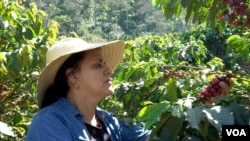Coffee has become the engine of reconciliation and economic prosperity for the victims and perpetrators of the armed conflict in Colombia, specifically in the town of Planadas, where the extinct guerrilla of the Revolutionary Armed Forces of Colombia (FARC) was born 60 years ago.
Coffee growers such as Astrid Medina, Aparicio Yule and Mariana Lombana have found in cultivation a path to peace between the producing families, the Nasa indigenous community and ex-combatants of the insurgent group.
In this area of the department of Tolima, which for decades suffered the scourge of the most intense armed conflict in Colombia, coffee has become a symbol of reconstruction.
Planadas is located in the foothills of the central mountain range of the Colombian Andes. In the hamlet of Gaitania, one of the birthplaces of the FARC in 1964, residents have opted for reconciliation since the signing of the historic Peace Agreement between the guerrilla and the Colombian government about eight years ago.
“In 2016, when the peace agreements arrived, there was a lot of anxiety; It was not known if it was for better or worse because the FARC ruled here. I remember that, when the peace signers arrived, we cried because the armed men we expected did not arrive, but rather families with their children and their pets,” he told Voice of America Astrid Medina, a coffee farmer.
Heal through work
“Since then we have accepted and forgiven each other, we made peace. Peace has transformed us and made us believe in our territory,” added Medina, whose father was taken away by the bloody conflict in 2006.
His farm, located in the San Miguel village, in the middle of the Las Hermosas Canyon, produces coffee for buyers from the United States, Japan and Norway. In 2015, its grain was recognized by experts as the best in the world.
“Forgiveness is the best decision one can make; The day you forgive is not for the person who hurt you, but for yourself, because that day you begin to express what you have inside, to say: ‘I cannot do the wrong to the other that they did to me, I must be different,’ he adds. Astrid.
The impact of the conflict also marked Aparicio Yule, from the Nasa Wes’x community, whose parents were murdered by members of the FARC. Today, they process coffees of the highest quality together with former combatants.
“We all work with coffee, they (peace signers) and we roast the coffee together, it is a beautiful process. We tell our stories of the conflict and promote coffee projects, despite the sadness, looking forward,” Yule told the VOA.
“Coffee drives us to grow. We processed it and sold it 10 years ago. Before we only sold the grain, now for us it is gold,” adds Yule, who highlights how they have left violence behind to dedicate themselves to planting coffee.
coffee region
Planadas has historically been a center of coffee production in Tolima, which has 106,000 cultivated hectares, the majority coming from this region.
This group of coffee growers told the Voice of America how, after the signing of the peace agreement in 2016, they focused on developing coffee production projects, following the tradition of the area.
“Our project seeks a coffee of high quality standards, profitable and self-sustainable for the families that make it up,” explains Mariana Lombana, daughter of peace signatories and member of the Esperanza y Paz Association (EPZ), which seeks to achieve flavors and aromas unique to the grain.
About 30 families and 19 peace signers benefit from this organization. “The goal is for the association to grow and be self-sufficient. This peace process has contributed to our life project, and we have opted for peace,” Lombana added.
For this reason, they say that they have turned the pages of violence that have marked the history of their town. Now they “value the peace” that Planadas is experiencing today because they know what it means to be under an armed conflict, they say.
“Life must be preserved; What characterizes us most here is the power of forgiveness. That is why coffee represents work from the territory, where, despite adversity, we have worked together,” Astrid Medina concluded.
Connect with the Voice of America! Subscribe to our channelsYouTube, WhatsApp and to newsletter. Turn on notifications and follow us on Facebook, x and instagram.



![[Img #74675]](https://thelatestnews.world/wp-content/uploads/2024/12/They-discover-a-new-class-of-X-ray-sources-in-the-150x150.jpg)













Add Comment